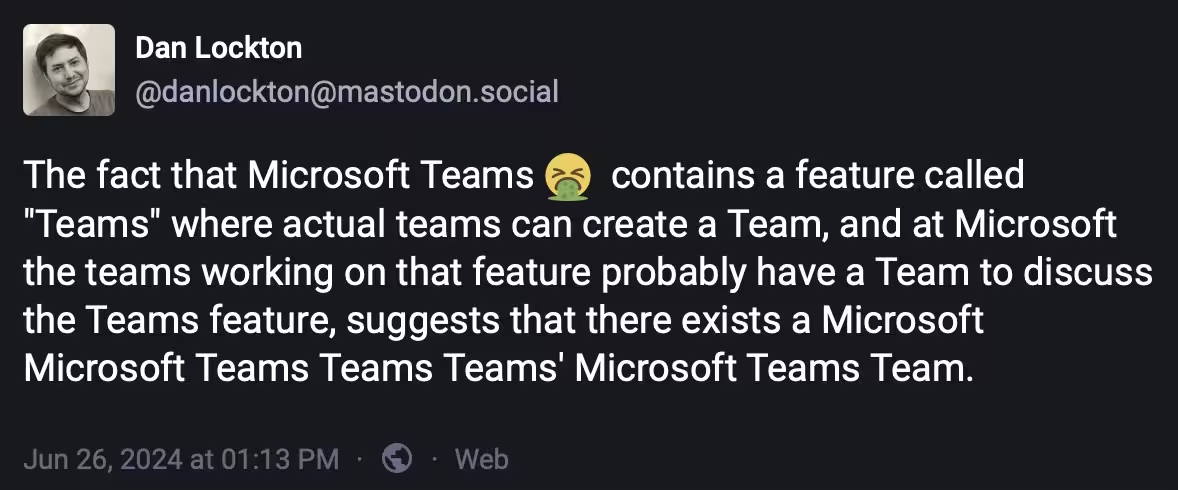Please use $XDG_CONFIG_HOME (and other XDG base dies)
Andromxda 🇺🇦🇵🇸🇹🇼
Mastodon: @Andromxda@infosec.exchange
wiki-user: Andromxda
- 14 Posts
- 424 Comments

 1·5 days ago
1·5 days agoThat’s because most of the parties here suck.
 22·9 days ago
22·9 days agoHenry Ford doesn’t deserve to be compared to Elon the dipshit

 5·14 days ago
5·14 days agoIs there an alternative that isn’t directly tied to an apartheid state committing genocide?
Yeah there are countless alternatives (at least here in Germany, but Germans are obsessed with sparkling water so YMMV depending on where you are). A soda maker ain’t some crazy technology, it’s a CO₂ cylinder, a valve, and something that holds the bottle, in fact, it’s so simple, other comments suggest to just build one yourself: https://lemmy.world/comment/13959890
Just make a couple of Google (or preferably DuckDuckGo) searches for “soda maker” or “sodastream alternative” and I’m sure you’ll find something that suits your needs.

 1·14 days ago
1·14 days agoSo, Android 9 / 10?
In that case, no. I assumed we were talking about up-to-date devices.

 1·16 days ago
1·16 days agoWe don’t know everything it can do
Neither do we know this about any other CPU on the market. All chipsets on the market are proprietary. All of them. And no, despite many people (who don’t know anything about what they are talking about) claiming this, RISC-V won’t actually solve any of these issues. Sure, the ISA is open source, but the ISA would be the worst place for malicious actors to introduce a backdoor. I can guarantee you that despite using the RISC-V ISA, the chips themselves will still be fully proprietary and the IP will be highly protected as trade secrets. You can build a fully RISC-V conformant chip with a backdoor, there’s absolutely nothing in place that could stop this, and it surely won’t change for the forseeable future.

 1·17 days ago
1·17 days agoDo you mind sharing which bank you use?

 2·17 days ago
2·17 days agoYou can use this website to check if your banking app is supported: https://privsec.dev/posts/android/banking-applications-compatibility-with-grapheneos/

 11·17 days ago
11·17 days agoLineageOS itself drastically weakens security even compared to stock AOSP, for example by exposing root access or deploying insecure SELinux policies

 1·17 days ago
1·17 days agoYup, it’s definitely worse https://madaidans-insecurities.github.io/android.html#lineageos

 1·14 days ago
1·14 days agoSecurity-wise you’re better off using whatever OS comes with your device (as long as it gets updates) than downgrading to LineageOS. At least most smartphone vendors (except for Fairphone) manage to ship their Stock OS with a locked bootloader and somewhat working Verified Boot.

 3·17 days ago
3·17 days agoYeah those are the main reasons. It’s also proprietary, and the only way you to create an account/back up your stuff is by entering a phone number, which isn’t exactly great for privacy.

 31·17 days ago
31·17 days agoThose conspiracy theories often come up in discussions here on Lemmy, but the TLDR is: Google is a tiny player in the smartphone market, compared to vendors like Apple, Samsung, Huawei, Xiaomi, and others (https://www.statista.com/chart/25463/popularity-of-google-smartphones/). They also serve a much smaller geographical region than most other manufacturers. The Pixel 9 lineup, for example, is only sold in 32 countries. Most of those are wealthy industrial nations. Google doesn’t even try to assume market share in developing countries in Africa and Asia. It can also be assumed that over 97% of Google Pixel users keep the Stock Pixel OS, where Google doesn’t need a hardware backdoor since they can just implement it in software. So that leaves only a tiny fraction of all users: people in some wealthy industrial nation who specifically buy a Pixel to install a custom ROM. GrapheneOS for example has about 300K users. Do you really think Google would put in the effort to create a hardware backdoor and take all the risk associated with it (negative PR, loss of sales, etc.) just to collect some data about this tiny amount of users? Google already controls EVERY Android phone on the market by forcing vendors to include Google Play Services as a system application through their contracts, licensing and monopolistic market position. Be realistic for a second, and you will realize that your backdoor theories make absolutely no sense and that no business in the world would ever take such a huge risk with such little reward.

 5·17 days ago
5·17 days agoAuthy sucks anyway.

 2·17 days ago
2·17 days agoNot with GrapheneOS, since you can entirely disable the USB controller from the settings on a driver level, making it impossible to connect the phone to a forensic data extraction device. GrapheneOS also has a convenient auto-reboot feature, which (together with their patches to the Linux kernel and Fastboot recovery OS to include memory zeroing) erases the encryption keys from memory, putting the device in BFU state and requiring the PIN/password to unlock. This is additionally secured by the Titan M2 secure element, which makes use of the Weaver API and drastically throttles brute-force unlock attempts. https://grapheneos.org/faq#encryption

 21·17 days ago
21·17 days agoAll of these are insecure as hell. Linux phones especially https://madaidans-insecurities.github.io/linux-phones.html
Fairphone also really fucked up: They signed their own OS with the publicly available (!) AOSP test signing keys. These guys really don’t know that they’re doing, and I would trust their hardware or software whatsoever. And no, installing a custom ROM doesn’t solve this. Considering how bad their security practices are, we genuinely have to assume that there are security issues with the device firmware as well.
/e/OS is based on the already insecure LineageOS, and it weakens the security further, so it’s not a good option either.
None of the options you mentioned can be compared to GrapheneOS. It’s currently the best option if you value your privacy and security. You don’t have to give Google money either, since you can just buy a used device, which is also cheaper and more environmentally friendly. Google also makes repairing their devices pretty easy for consumers and even works with iFixit. Here’s a Mastodon post I recently saw about that: https://social.linux.pizza/@midtsveen/113630773097519792

 3·17 days ago
3·17 days agoalthough you need another trusted graphene phone to use it
No, Auditor can be installed on any Android phone. It’s even available on the Play Store: https://play.google.com/store/apps/details?id=app.attestation.auditor.play
You can even perform a remote verification, which uses GrapheneOS servers and doesn’t require a second device at all: https://attestation.app/tutorial#scheduled-remote-verification

 2·17 days ago
2·17 days agoAnd you can even use the GrapheneOS Auditor app to perform a manual verification of the OS.

 29·17 days ago
29·17 days agoI don’t think it’s a coincidence that the shittiest companies are those, who enforce Google’s broken and monopolistic “Play Integrity” API. Revolut has connections to Russia, McDonalds supports the Israeli genocide in Palestine and Authy has always just been a massive piece of shit, not even allowing users to export their TOTP seeds. These are three companies I would NEVER even consider using anyway.
And “Play Integrity” API actually does NOTHING, absolutely NOTHING for your security as an end user.
You use an outdated, unpatched Android version with multiple severe, publicly known exploits on an insecure device?
Google doesn’t give a single fuck.
You use the newest version of Android with all the patches applied on Google’s own hardware, with a locked boot loader and a hardened operating system?
That’s not allowed by the “Play Integrity” API.
It’s only purpose is to serve Google’s monopolistic business interests.







Pros:
Cons:
Things to look out for when choosing a VPN provider: